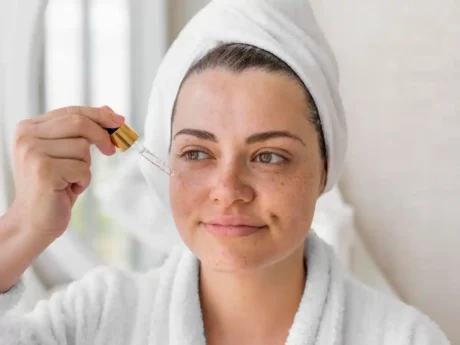
What is Serum?
Serum is a skincare or haircare product with a high concentration of active ingredients that aim to address specific issues or improve the overall condition of the skin or hair. Serums are typically lightweight in texture, available in liquid or gel form, enabling them to penetrate deep into the skin layers or skinhair fibers faster and more effectively than traditional creams or oils.
Serum Ingredients
Serums are characterized by concentrated, effective ingredients such as:
- Vitamins (e.g., Vitamin C, E, A): Help brighten the skin, fight aging, and improve skin appearance.
- Acids: Like Hyaluronic Acid, which deeply hydrates the skin, and Retinol, which promotes cell renewal and reduces wrinkles.
- Peptides: Stimulate collagen production and enhance skin elasticity.
- Natural Extracts: Such as Argan Oil and Coconut Oil, which provide deep hydration and nourishment for the skin and hair.
Why Use Serum?
- Concentration of Active Ingredients
Serums are effective due to their high concentration of active ingredients that target specific problems. Unlike traditional creams or oils, serums contain a greater concentration of key ingredients your skin or hair needs. - Deep Penetration
Thanks to its lightweight composition, serum can penetrate deep into the skin or hair, helping address issues faster and at a deeper level. - Targeted Solutions
Serums address specific issues such as dryness, hyperpigmentation, wrinkles, acne, or hair loss. With their potent formulas, they deliver quick and noticeable results.
Types of Serums: When to Use Facial Serum or Hair Serum?
Serums are vital for skincare and haircare, significantly improving health and appearance. Different types of serums cater to unique needs based on their key ingredients.
How Do Serums Work?
1. How Facial Serum Works
- Concentrated Active Ingredients:
Facial serums contain potent active ingredients such as Vitamins (e.g., Vitamin C), Acids (e.g., Hyaluronic Acid), and Retinol, which promote cell renewal, stimulate collagen production, and reduce wrinkles. - Deep Skin Penetration:
Serums are designed with small molecules that penetrate deeper into the skin layers, delivering active ingredients more effectively. - Enhancing Product Absorption:
Facial serums prepare the skin to absorb additional products like moisturizers or treatments.
Example: Tonedirma Hair Strengthening Serum
2. How Hair Serum Works
- Deep Hair Hydration:
Hair serums contain ingredients like Argan Oil or Coconut Oil that hydrate hair follicles deeply, preventing dryness and split ends. - Protecting Hair from Environmental Damage:
Some serums have protective components that shield hair from pollution and UV rays, reducing environmental damage. - Promoting Hair Growth:
Certain hair serums contain active ingredients like Biotin or Caffeine that stimulate the scalp, strengthen hair follicles, and boost hair growth.
Facial vs. Hair Serum: Effects on Skin and Hair
Facial Serum:
- Promotes radiant and firm skin by deeply hydrating and revitalizing it.
- Example: Hyaluronic Acid Serum attracts moisture to improve elasticity and smoothness.
Hair Serum:
- Promotes shiny and healthy hair by repairing damaged strands and preventing breakage.
- Example: Serums rich in proteins and oils repair damage and strengthen hair.
Types of Serums for Skin
- Vitamin C Serum: Brightens skin, reduces dark spots, and evens skin tone.
- Hyaluronic Acid Serum: Deeply hydrates skin and improves elasticity.
- Retinol Serum: Reduces aging signs like wrinkles and fine lines.
- Serum for Oily Skin: Contains ingredients like Salicylic Acid or Tea Tree Oil to control oil production.
- Anti-Wrinkle Serum: Stimulates collagen and reduces fine lines, ideal for mature skin.
Types of Hair Serums
- Nourishing Hair Serum: With ingredients like Argan Oil and Jojoba Oil for moisturizing dry, damaged hair.
- Serum for Oily Hair: Controls excess oil and shine with lightweight ingredients.
- Anti-Hair Loss Serum: Stimulates growth and strengthens hair with Biotin or Caffeine.
- Anti-Frizz Serum: Smoothens frizzy hair with silicone-based or anti-frizz components.
When to Use Facial and Hair Serum?
Facial Serum:
- Apply after cleansing and toning to allow better absorption of nutrients.
- Use morning and evening, depending on the serum type.
Hair Serum:
- Apply after washing hair and before styling to protect and hydrate the ends.
Tips for Choosing the Best Serum
- Know Your Skin Type:
- For oily skin: Choose a serum with Salicylic Acid.
- For dry skin: Opt for serums with Hyaluronic Acid.
- Target Specific Needs:
- Brightening: Vitamin C Serum.
- Anti-aging: Retinol Serum.
- Consistency is Key:
Regular use ensures optimal results, improving skin and hair appearance over time.What you can also see:
A complete guide to effectively removing blackheads from the face and nose
Conclusion
Serums are essential products for skincare and haircare, effectively addressing a variety of concerns. By understanding the types of serums and choosing the right product for your needs,sandra derma you can achieve healthy, radiant skin and strong, shiny hair. Be sure to select serums with natural and safe ingredients for the best results.
